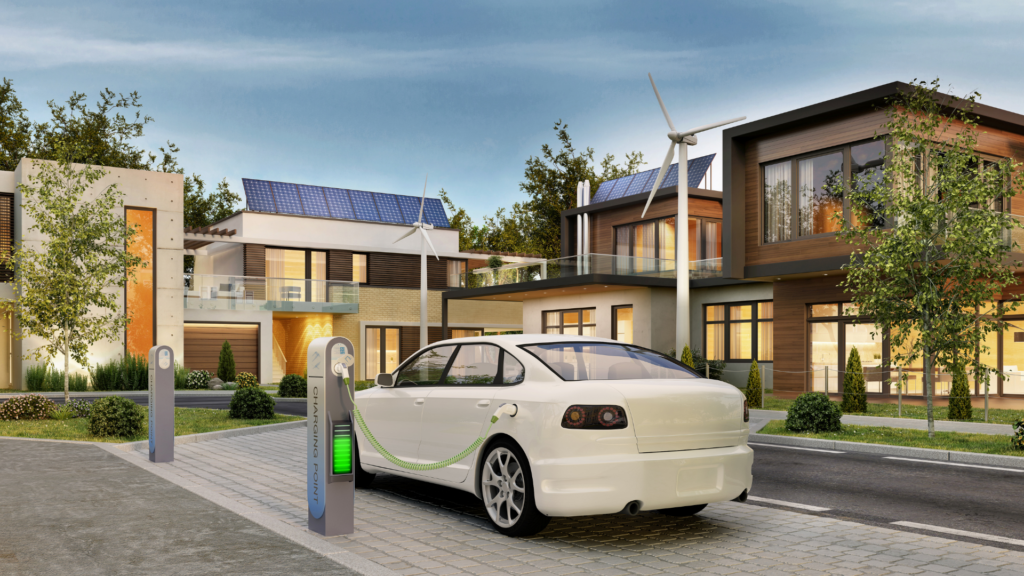Our CEO Luke Loveridge sat down with Professor Furong Li recently to get her views on the UKs energy system and what it means for hitting our net zero targets.
Furong is an expert in energy power systems at the University of Bath and is working on ways in which we can integrate renewables, electric vehicles and other low carbon technologies efficiently whilst keeping the lights on in our homes.

Luke: What are the current risks in the energy system?
Furong:
The UK, is always a risk taking nation, it was the first country to introduce carbon to our society, but also the first country put a zero carbon pledge into our targets and among the fastest in Europe to phase out coal power plants.
We are also the first nation to see some of the risks before some other countries.
I’m a power engineer and I focus on the risks to power system. So the electrical power systems are the systems that transport energy; renewable energy, nuclear power, and gas power energy into individual homes, schools and hospitals.
I would summarise the risks as energy price and energy security from decarbonisation. So energy system decarbonisation has shifted the landscape from a fossil based system to a renewable rich energy system.
Last year, we saw 40% of our electricity come from renewable energy or renewable solar or wind. There is an issue with a greater reliance on renewable energy that could expose us to extremely high prices or negative prices. High energy prices would dent our energy customers and negative prices could dent our energy producers. So as we’ve seen in recent months, when renewable output is low, and if that coincides with high gas prices driven by global demand, then we see a sustainable period of high energy prices and that would compromise ordinary business productivity, profitability and also we can see that really costs over 100 energy suppliers going out of business.
On the other hand, when renewable energy is abundant, but demand for these renewable energy is low, then we would see negative prices. It appears to be really good for energy customers. But if you look at it from a producers point of view, if when they produce energy, they actually lose money. If negative prices sustain for a significant period, that also might make those energy companies less profitable, so they might not want to continue to undergo improvements to support our low carbon transition.
Luke: How is the energy system changing in the UK?
Furong:
So our energy system is undertaking unprecedented changes. It’s shifted the energy landscape from a small number of large players to a large number of smaller, medium and large players.
For instance, we have electric vehicles, aggregators, distributed renewable energy and large offshore renewable farms. And this has formed a system of systems at the mega scale. In the past, we had a top-down centralised system where interaction between different parts of the system is really small, but in the new environment there are so many active devices that the interaction with the system becomes complex, and that really poses a new threat to our supply security that we’ve never see before.
A good example or bad example is the 9th August 2019, when over 1 million customers experienced between 15 to 50 minutes interruptions. And that’s primarily initially driven by a few large power plant failures. But as system frequency drops as these large plants ceased to operate correctly, and that also triggered a large volume of distributed generation. As the Ofgem investigation discovered the loss of distributed generation over that event is greater than transmission connected to power generation. So at a time when distributed generation to support our system of security of supply, at the precise moment, over 1,300 megawatts of further distributed generation was tripped off. So that contributed to large supply interruption, greatly.
So I think this is the what we see as we use the current system. By 2030 if we have more renewable generation and we have millions of electric vehicles and heat pumps and how this low carbon technology operates for under system frequency and over system frequency may have a huge impact on our future supply security.
Luke: What research are you currently conducting?
Furong:
The University of Bath has over 30 years experience in teaching and research in electrical power systems. And over this 30 years, of course, our teaching on the research has evolved to keep up with the changes in the energy landscape and changing needs of our energy industry and energy customers. For example, in the past we primarily worked with the National Grid, Centrica and Western power Distribution, Northern Power Grid. And nowadays we are working more closely with customer facing companies like Propflo.
So I would say that our current research falls into three key areas that relate to decarbonisation, digitalisation and decentralisation.
On the decarbonisation front, we are developing a new system of modelling analysis to help the system operators develop their system so they can integrate renewables, electric vehicles and heat pump quicker and cheaper, and we’re also looking into how to operate the system better so we can maximise the utilisation of renewable energy and maximising the utilisation of customer flexibilities.
On the digitalisation front, we actively develop data and analytical tools to extract insights into network conditions, renewable availabilities, and the customer information. And we would like to use this information to inform how to use a minimum, or the smallest set of information, to represent the dynamic of the whole system, rather than monitoring system information at every single node in the system.
For example, in the UK, we have over 1 million low voltage substations and we possibly then need to monitor every single substation in great detail. And another part we are actively researching into is how to use a combination of metered information and social demographic information that can predict, control and optimise renewable energy on the customer usage pattern and the customer flexibility. So again, trying to maximise the utilisation of renewable energy and the customer flexibility.
Finally, on the decentralisation part, Bath is at the forefront of techno economic analysis to inform reforms in network charges, and that reflects the network costs by integrating different to generation and demand technologies. We are also actively looking into reforming energy balancing and frequency markets so that they would support growing a renewable generation play into the right markets, and that helps power millions of electrical vehicles and heat pumps.
When I first joined the university some 20 years ago I was recruited as an artificial intelligence expert to address difficult problems, and that seems almost impossible to represent by mathematical analytical equations such as reactive power, standing reserve optimisation. And at present, I’m working on network charges and ancillary market to ensure our renewable energies, meet our low carbon transition.
Propflo supports homeowners, sellers and buyers with property scores, insights and services with an AI-first product road map.
Check what data people can see on your home, take control, protect its value




